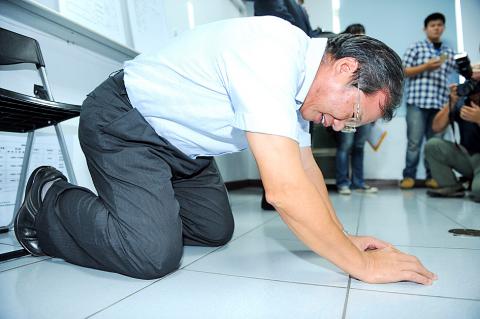The Supreme Court yesterday rejected an appeal by Chang Guann Co Ltd (強冠企業) executives against convictions for their role in the 2014 food scandal that saw the company sell recycled waste oils as edible lard to the food industry.
Company chairman Yeh Wen-hsiang (葉文祥) and deputy general manager Tai Chi-chuan (戴啟川) do not have legal grounds for an appeal, the Supreme Court said, dismissing their legal challenge against a High Court decision made in August last year.
The Supreme Court decision is final and Yeh and Tai are to serve the sentences handed down by High Court, the Supreme Court said.

Photo: Chang Chung-yi, Taipei Times
Yeh was found guilty of 285 charges, ranging from aggravated fraud to violations of the Act Governing Food Safety and Sanitation (食品安全衛生管理法).
He has been sentenced to 22 years in prison, with five years commutable to a fine.
Tai has been sentenced to 18 years in prison, with four years commutable to a fine.
The High Court last year fined Chang Guann NT$120 million (US$3.99 million at the current exchange rate) and confiscated NT$81.5 million of the company’s funds in accordance with the Criminal Code (刑法) which was amended a month prior to the judgement.
However, the Supreme Court remanded convictions against oil manufacturing subcontractor Kuo Lieh-cheng (郭烈成) — also known as Kuo Ying-chih (郭盈智) — and a truck driver surnamed Shih (施), to the High Court, saying their convictions were “incomplete and contradictory.”
The oil scandal became public knowledge in 2014, when a farmer in Pingtung County’s Jhutian Township (竹田) reported Kuo’s unlicensed factory to police.
Investigators accused Kuo of manufacturing oil to be sold for human consumption from animal-feed oil and leather-care products, which were collected by Shih and sold to Yeh and Tai.
Yeh and Tai knowingly procured the recycled oil at between NT$26 and NT$30 per kilogram and processed it into various lard products that they sold to 285 food industry producers at between NT$40 and NT$55 per kilogram, prosecutors said.
Chang Guann derived more than NT$40 million in profits from the production, prosecutors said.
The case was first tried at the Pingtung District Court, which found the defendants guilty in July 2015.
Yeh and Tai were each sentenced to 20 years in prison, with five years commutable to a fine.
Kuo was sentenced to 12 years in prison and Shih to eight.
The defendants filed appeals and the case was tried at the High Court’s Kaohsiung branch.
In August last year, the court handed down heavier sentences to Yeh and Tai, and increased the fine on Chang Guann.
The high court sentenced Kuo to 23 years and six months in prison and Shih to two years and six months, which were overturned by the Supreme Court’s decision yesterday.
They are to be retried at the High Court’s Kaohsiung branch.

CARROT AND STICK: While unrelenting in its military threats, China attracted nearly 40,000 Taiwanese to over 400 business events last year Nearly 40,000 Taiwanese last year joined industry events in China, such as conferences and trade fairs, supported by the Chinese government, a study showed yesterday, as Beijing ramps up a charm offensive toward Taipei alongside military pressure. China has long taken a carrot-and-stick approach to Taiwan, threatening it with the prospect of military action while reaching out to those it believes are amenable to Beijing’s point of view. Taiwanese security officials are wary of what they see as Beijing’s influence campaigns to sway public opinion after Taipei and Beijing gradually resumed travel links halted by the COVID-19 pandemic, but the scale of

TRADE: A mandatory declaration of origin for manufactured goods bound for the US is to take effect on May 7 to block China from exploiting Taiwan’s trade channels All products manufactured in Taiwan and exported to the US must include a signed declaration of origin starting on May 7, the Bureau of Foreign Trade announced yesterday. US President Donald Trump on April 2 imposed a 32 percent tariff on imports from Taiwan, but one week later announced a 90-day pause on its implementation. However, a universal 10 percent tariff was immediately applied to most imports from around the world. On April 12, the Trump administration further exempted computers, smartphones and semiconductors from the new tariffs. In response, President William Lai’s (賴清德) administration has introduced a series of countermeasures to support affected

Pope Francis is be laid to rest on Saturday after lying in state for three days in St Peter’s Basilica, where the faithful are expected to flock to pay their respects to history’s first Latin American pontiff. The cardinals met yesterday in the Vatican’s synod hall to chart the next steps before a conclave begins to choose Francis’ successor, as condolences poured in from around the world. According to current norms, the conclave must begin between May 5 and 10. The cardinals set the funeral for Saturday at 10am in St Peter’s Square, to be celebrated by the dean of the College

MORE VISITORS: The Tourism Administration said that it is seeing positive prospects in its efforts to expand the tourism market in North America and Europe Taiwan has been ranked as the cheapest place in the world to travel to this year, based on a list recommended by NerdWallet. The San Francisco-based personal finance company said that Taiwan topped the list of 16 nations it chose for budget travelers because US tourists do not need visas and travelers can easily have a good meal for less than US$10. A bus ride in Taipei costs just under US$0.50, while subway rides start at US$0.60, the firm said, adding that public transportation in Taiwan is easy to navigate. The firm also called Taiwan a “food lover’s paradise,” citing inexpensive breakfast stalls